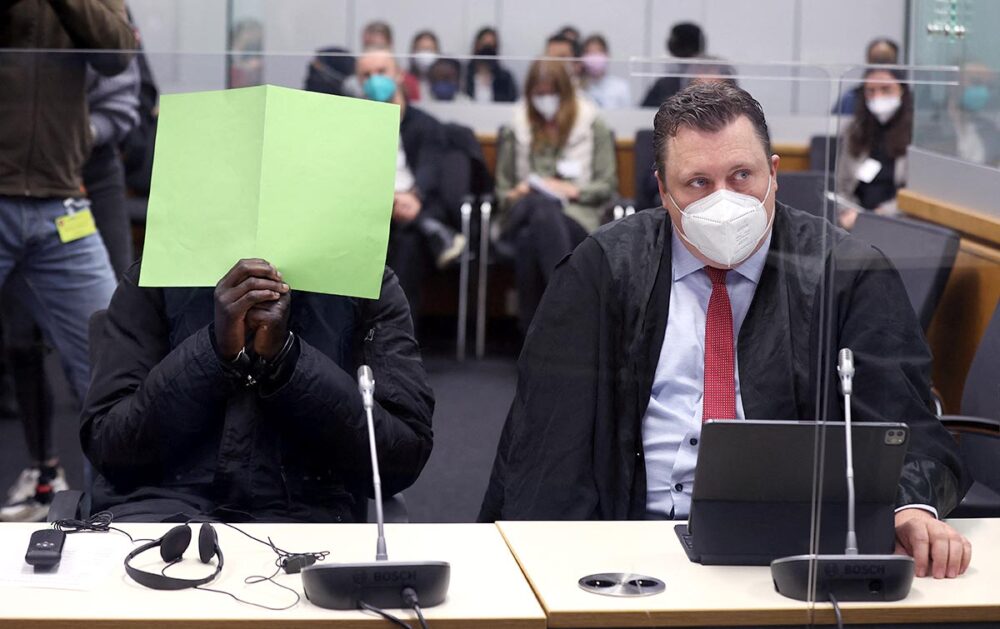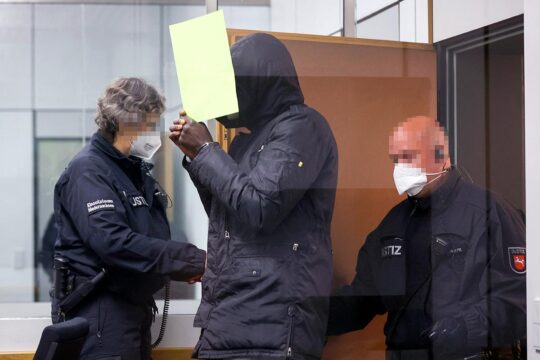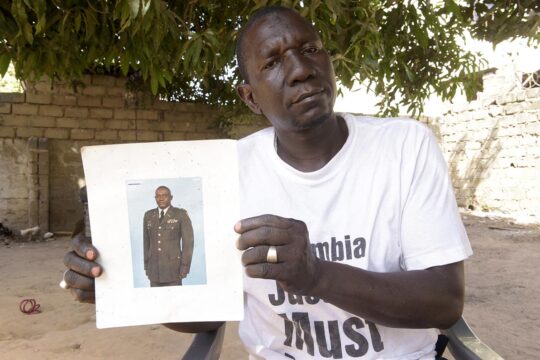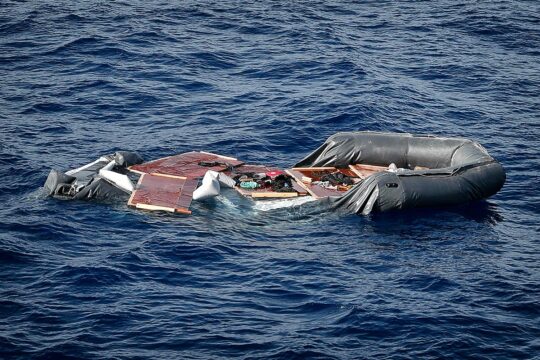“Would anyone in their right mind appear on the radio and confess to having committed murder?,” asked Bai Lowe in his final statement in court, insinuating that the answer could only be no. And yet, that is exactly what the prosecution in Celle, Germany, believes he did. In an emotional final statement on November 24, the defendant from Gambia urged everyone to believe that he had never been part of ex-President Yahya Jammeh’s killing squad, that he had only shared what he knew from hearsay – and that his sole motivation had been to liberate his home country from dictatorship.
Next Thursday, November 30th, the verdict is expected in Germany’s case against Bai Lowe for crimes against humanity committed in Gambia between 2003 and 2006. According to the indictment, the former dictator ordered his killing squad, the “Junglers” to assassinate investigative journalist Deyda Hydara and two of his employees, as well as a lawyer and a former soldier who Jammeh perceived as threats to his regime. Lowe is accused of being the death squad’s driver. He allegedly drove the killers to their missions and in Hydara’s case used the car to block the victim’s vehicle. The most important evidence against Lowe is an interview he gave in 2013 to the oppositional US-based Freedom Radio, where he describes being present during the attacks. But in their closing arguments, he and his lawyer reiterated Lowe’s claim that he had lied about being there, to make his testimony more credible and expose Jammeh’s crimes to Gambia and the world.
Contradictory accounts on Hydara’s killing
The 61st day of the proceedings against Lowe started on a stormy morning in the Northern German city of Celle. Lowe appeared in court with a black hooded jacket and his usual black sneakers. In his hands, he held some rolled up pieces of paper, an indication that he would make use of his right to address the court in a “last word”. But first, it was his lawyer Matthias Kracke’s turn to speak. He started his statement with a quote from German poet Friedrich Schiller: “I am ready to die and beg not for my life,” adding that these might as well be the words of his client, who had put himself at risk by exposing the crimes of Jammeh and the Junglers to the public.
According to the lawyer, the findings of the court were not sufficient to prove Lowe’s involvement in those crimes beyond reasonable doubt. To underline this, Kracke first took some time to question the proceedings as a whole. The trial is possible due to the principle of universal jurisdiction that allows Germany to prosecute the gravest crimes against international law, such as crimes against humanity, genocide or war crimes. According to Kracke, “such a trial is marked by problems, especially for the defense.” For example, some of the most important witnesses and pieces of evidence were in Gambia, not Germany. This would not have been an issue, said Kracke, if the Gambian government had cooperated. Instead, it had ignored the rogatory letters from Germany throughout most of the trial.
As a result, “what we have is mostly indirect evidence such as hearsay, open source, and testimonies.” Kracke also mentioned that the findings of the Gambian Truth, Reconciliation and Reparations Commission (TRRC) had played a big role in court, but criticized that translating the TRRC statements was not as good as interrogating witnesses directly. “It is difficult to evaluate the evidentiary value” of these statements, he said and, as an example, reexamined the different accounts of Hydara’s killing, which he deemed contradictory.
In his interview with Freedom Radio, Lowe had mentioned three vehicles involved in the attack on Hydara, two of which had heckled the journalist’s car forcing him to stop. However, other reports and statements, including the testimony of Ida Jagne, who had been in the car with Hydara, only mentioned one car. Jungler Malick Jattah on the other hand, who had been part of the hit squad that day, told the TRRC of several cars. But he claimed that only one of them was involved in the killing. In that car, Tumbul Tamba was driving, and Jattah was firing the shots together with Alieu Jeng and Sana Manjang. “All accounts describe a different course of events”, concluded Kracke in an attempt to contradict the prosecution’s evaluation of Lowe’s interview as credible.
Also, this could mean, that even if Lowe was present at the crime scene, he might have been in a vehicle that was not directly involved in Hydara’s killing. Kracke quoted Jattah as saying that the other cars “were far behind the victim’s vehicle.” The role of those cars is unclear, according to the lawyer. “Whether or not Lowe was sitting in one of the cars, remains open. But the question whether driving another car would qualify him as a co-perpetrator must be answered with No.”
Lying to make statements more credible
With regards to the killing of Dawda Nyassi, Kracke argued that the TRRC had found Jammeh and several Junglers responsible. If Lowe had been present at the crime scene, Kracke argued, surely the other perpetrators would have mentioned him in their statements at the TRRC. After all, it was his interview that had exposed the crimes of Alieu Jeng and Malick Jattah. “They had no reason at all to protect him”, said Kracke. And yet, “the defendant is not mentioned in the report.” (Indeed, the TRRC’s final report only recommends Lowe for investigation in connection with the 2005 massacre of West-African migrants.)
At this point, Kracke dove back into his client’s defense, that he had lied about being involved in order to make his statement more credible. Kracke explained why this would make a lot of sense: in 2012, journalist Pa Nderry Mbai had published a book on Jammeh’s crimes, but had failed to “trigger the outcry he had hoped for in Gambia.” This is why Mbai wanted Lowe to reveal his knowledge but present it as a first-hand account, said Kracke. “If he had merely talked about it as someone who heard the information from others, Mbai’s plans would not have succeeded.”
Finally, Kracke disagreed with the prosecution who had claimed that Lowe’s interviews were full of details and met most of the criteria that indicate he was recounting his own experience. “There were not that many details,” said Kracke, adding that Lowe’s statements did not concur with those of other witnesses and that they varied over time. If, then, the interviews were not credible, they could also not be used to prove the defendant’s involvement in the attempted murder of Ousman Sillah, “for which there was hardly any evidence besides the interviews.”
Kracke asked the judges to acquit Lowe, although he did not believe that “they shared his doubts” and that “his speech would be able to change that.” In case of a conviction, he urged the court to consider Lowe a principal witness and lower his penalty accordingly.
“That really hurt me”
The defendant himself had been listening quietly to his lawyer’s final plea, his leg occasionally breaking into a nervous jiggle. When chief judge Günther asked him whether he wanted to make a final statement, he answered “Yes. Ja”, and hectically proceeded to the stand, where he greeted the trial participants as well as the journalists and the public with a smile and a “Salam alaikum”. What followed was a 45-minute long, mostly improvised, at times messy, and in part highly emotional speech by Lowe on the whole of his military career and a number of people, places and events that led up to the fateful interview.
It was hard to follow the defendant, who jumped back and forth between different years and events, between commenting on the crimes and pleading his innocence to the court. One of the points he made was that he was not, in fact, part of the Junglers, and that it were Tumbul Tamba, Malik Jattah, Alieu Jeng and Sana Manjang who killed Hydara. “Nobody other than these four was involved. All of the murders were committed by these four.”
At the time, he himself had not known that Jammeh was behind the killings. This changed after a conversation he had with Jattah after a failed coup attempt in 2006. One of the many people arrested and killed in its aftermath, was apparently Lowe’s half-brother. He thought he had survived and escaped, until Jattah told him that the Junglers had broken his legs and then killed him. At this point of his speech, Lowe fell silent for a moment, visibly struggling to keep his composure. “That really hurt me”, he said, in tears. “I was shocked.”
The plot
He went on to explain how the killing of his brother and another close friend had made him want to investigate. Sniffling, he described how he bought rice and alcohol and even stole some of Jammeh’s sheep to bring to the Junglers, get them drunk and get all the information he needed from them. “When I had the information, how could I not have shared it with Gambians? That would have made me an accomplice of Jammeh,” said Lowe. “He had the whole country in his hand and nobody dared say anything.” Through a friend, he found out about journalist Pa Nderry Mbai and the Freedom Radio, but noticed that some of his reporting was not accurate. “I had to contact him and tell him the truth. I had first-hand information.”
The prosecution was right in how they described the crimes, said Lowe, gesturing intensely. “What I described in the interviews is what happened. But for the people to believe the story, someone had to sacrifice themselves. I knew this would get me into trouble, but I was wearing the uniform and was willing to die for my country.” He swore that he was not a criminal and that he would gladly testify in any court that put Jammeh on trial. Addressing the judges directly, he said: “You have done a good job, but you have charged an innocent person.”








